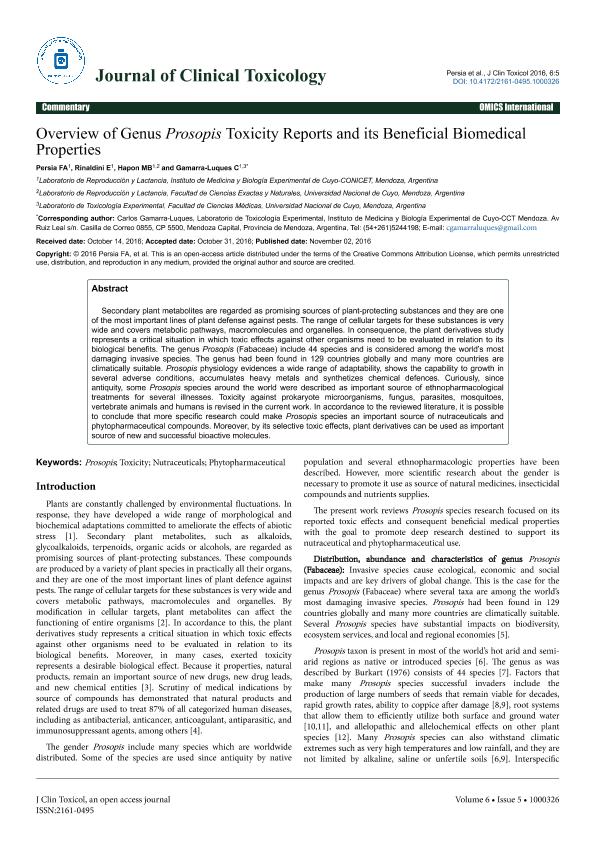Mostrar el registro sencillo del ítem
dc.contributor.author
Persia, Andres

dc.contributor.author
Rinaldini, Estefanía

dc.contributor.author
Hapon, María Belén

dc.contributor.author
Gamarra Luques, Carlos Diego

dc.date.available
2018-06-22T20:27:52Z
dc.date.issued
2016-11
dc.identifier.citation
Persia, Andres; Rinaldini, Estefanía; Hapon, María Belén; Gamarra Luques, Carlos Diego; Overview of Genus Prosopis Toxicity Reports and its Beneficial Biomedical Properties; OMICS; Journal of Clinical Toxicology; 6; 5; 11-2016; 1-7
dc.identifier.issn
2161-0495
dc.identifier.uri
http://hdl.handle.net/11336/49781
dc.description.abstract
Secondary plant metabolites are regarded as promising sources of plant-protecting substances and they are one of the most important lines of plant defense against pests. The range of cellular targets for these substances is very wide and covers metabolic pathways, macromolecules and organelles. In consequence, the plant derivatives study represents a critical situation in which toxic effects against other organisms need to be evaluated in relation to its biological benefits. The genus Prosopis (Fabaceae) include 44 species and is considered among the world’s most damaging invasive species. The genus had been found in 129 countries globally and many more countries are climatically suitable. Prosopis physiology evidences a wide range of adaptability, shows the capability to growth in several adverse conditions, accumulates heavy metals and synthetizes chemical defences. Curiously, since antiquity, some Prosopis species around the world were described as important source of ethnopharmacological treatments for several illnesses. Toxicity against prokaryote microorganisms, fungus, parasites, mosquitoes, vertebrate animals and humans is revised in the current work. In accordance to the reviewed literature, it is possible to conclude that more specific research could make Prosopis species an important source of nutraceuticals and phytopharmaceutical compounds. Moreover, by its selective toxic effects, plant derivatives can be used as important source of new and successful bioactive molecules.
dc.format
application/pdf
dc.language.iso
eng
dc.publisher
OMICS
dc.rights
info:eu-repo/semantics/openAccess
dc.rights.uri
https://creativecommons.org/licenses/by-nc-sa/2.5/ar/
dc.subject
Prosopis
dc.subject
Toxicity
dc.subject
Nutraceuticals
dc.subject
Phytopharmaceutical
dc.subject.classification
Toxicología

dc.subject.classification
Medicina Básica

dc.subject.classification
CIENCIAS MÉDICAS Y DE LA SALUD

dc.title
Overview of Genus Prosopis Toxicity Reports and its Beneficial Biomedical Properties
dc.type
info:eu-repo/semantics/article
dc.type
info:ar-repo/semantics/artículo
dc.type
info:eu-repo/semantics/publishedVersion
dc.date.updated
2018-06-18T19:09:45Z
dc.journal.volume
6
dc.journal.number
5
dc.journal.pagination
1-7
dc.journal.pais
Estados Unidos

dc.journal.ciudad
Nevada
dc.description.fil
Fil: Persia, Andres. Consejo Nacional de Investigaciones Científicas y Técnicas. Centro Científico Tecnológico Conicet - Mendoza. Instituto de Medicina y Biología Experimental de Cuyo; Argentina
dc.description.fil
Fil: Rinaldini, Estefanía. Consejo Nacional de Investigaciones Científicas y Técnicas. Centro Científico Tecnológico Conicet - Mendoza. Instituto de Medicina y Biología Experimental de Cuyo; Argentina
dc.description.fil
Fil: Hapon, María Belén. Universidad Nacional de Cuyo. Facultad de Ciencias Médicas; Argentina. Consejo Nacional de Investigaciones Científicas y Técnicas. Centro Científico Tecnológico Conicet - Mendoza. Instituto de Medicina y Biología Experimental de Cuyo; Argentina
dc.description.fil
Fil: Gamarra Luques, Carlos Diego. Consejo Nacional de Investigaciones Científicas y Técnicas. Centro Científico Tecnológico Conicet - Mendoza. Instituto de Medicina y Biología Experimental de Cuyo; Argentina. Universidad Nacional de Cuyo. Facultad de Ciencias Médicas; Argentina
dc.journal.title
Journal of Clinical Toxicology
dc.relation.alternativeid
info:eu-repo/semantics/altIdentifier/doi/http://dx.doi.org/10.4172/2161-0495.1000326
dc.relation.alternativeid
info:eu-repo/semantics/altIdentifier/url/https://www.omicsonline.org/open-access/overview-of-genus-prosopis-toxicity-reports-and-its-beneficial-biomedicalproperties-2161-0495-1000326.php?aid=81635
Archivos asociados
